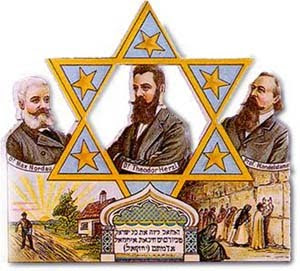
Zionism is a Jewish nationalist movement, which developed during the second half of the 19th century among Jews of Central and Eastern Europe. Zionism sees itself as the the modern form of a millennia-old dream of Jewish people to rebuild a Jewish state in the land of Israel (one of the proposed names for this state was Zion). Many different Zionist groups exist, each expressing a unique political, social and religious position. Almost all of these groups have and continue to co-operate through the World Zionist Organization[?] (WZO).
Historical origins of Zionism
The desire of Jews to return to their ancestral homeland was first expressed during the Babylonian exile and became a universal Jewish theme after the destruction of Jerusalem and Judea by the Roman Empire in 70 A.D. and the dispersal that followed.
Until the rise of political Zionism in the early 1800s, most religious Jews believed that the Jewish people would only return to Israel with the coming of the messiah, i.e., only after divine intervention. Indeed, many even believed that Jews were divinely forbidden to attempt to establish a state prior to the coming of the Messiah (see Neturei Karta). Many people proposed that Jews attempt to return earlier, by their own devices, but until the rise of Zionism in the 19th century they were a minority.
Zionism in the modern era
One of the key moments of the modern Zionist movement was the publishing of Theodor Herzl's pamphlet Der Judenstaat in 1896. In 1897, Herzl organized the first Zionist Congress in Basel, Switzerland. At this Congress, the WZO was established, and Herzl named its President. The Congress gave this definition of the aims and means of Zionism:
The aim of Zionism is to create for the Jewish people a home in Palestine secured by public law.
The Congress contemplates the following means to the attainment of this end:
1. The promotion, on suitable lines, of the colonization of Palestine by Jewish agricultural and industrial workers.
2. The organization and binding together of the whole of Jewry by means of appropriate institutions, local and international, in accordance with the laws of each country.
3. The strengthening and fostering of Jewish national sentiment and national consciousnesss.
4. Preparatory steps toward obtaining government consent, where necessary, to the attainment of the aim of Zionism.
Over the coming years, successive aliyahs[?] (literally: ascent, in this sense, immigration to Palestine) brought thousands of Jews from Poland, Russia, the Ukraine, and many other countries to Palestine, where they formed new communities and new institutions. The dominant trends in Zionist thought were Political Zionism, which emphasized gaining a charter for a Jewish homeland through international politics, along with Labor Zionism[?], Revisionist Zionism, and Religious Zionism.
Labor Zionism dominated most of the institutions of Zionism, including the World Zionist Organization and the Knesset, from early in the history of Zionism until 1977, when Likud, a political party descended from the merger of Revisionist parties, won the elections to the Knesset. Famour Labor Zionists included David Ben-Gurion, Berl Katznelson, and Yitzhak Ben-Zvi (among countless others).
Most of the Revisionist movement was founded by Vladimir Jabotinsky.

3 comentarios:
Soy Cami .K., ya entré!!!
Soy Cami.K. , yo ya entré!!!
HOLA DEBY SOY FEDE ENTRE A LA PÁGINA ES MUY LINDA ME ENCANTO Y ES MUY INTERESANTE.
TAMBIEN ME GUSTO EL VIDEO Y LA MUSICA DEL VIDEO.
CHAU
FEDE
Publicar un comentario